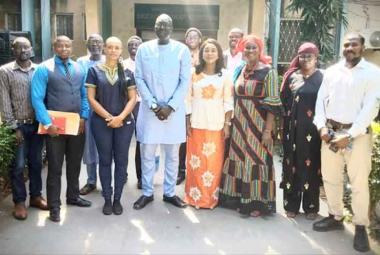By Awa Sowe
In an increasingly digital world, innovative technologies are revolutionising traditional methods of tax collection and enforcement. One such technology gaining prominence is the Digital Tax Stamp—a powerful tool with the potential to transform tax administration, combat counterfeiting, and secure revenue streams for governments worldwide.
The domestic market has fallen prey to unfair competition from counterfeit, smuggled and illicit products, of which the consequences of such products being introduced on the market not only result in the disruption of demand for local products, but also causes loss of Government revenue.
In its quest to fight illicit trade, the Government of The Gambia through The Gambia Revenue Authority is implementing the use of Digital Tax Stamps (DTS) as a source of Domestic Revenue Mobilisation (DRM). DTS are also usually used as a measure of track and trace (T&T) to curb counterfeit products.
The main objectives of introducing digital tax stamps are to protect government revenues, combat illicit trade, promote fair competition in the market and provide real time statistical data for both tax policy and better analysis and audit of the supply chain.
The digital tax stamp on specific excise goods is a tax managing scheme introduced to strengthen tax administration and compliance in line with international best practices. Digital tax stamps allow to monitor, track and trace the movement of excise goods throughout the supply chain.
The digital tax stamp covers products such as bottled water, soft drinks including juice, beer, wines and spirits, flour 50kg pack, tobacco, cigarettes, cigar tobacco leaves, and cigarillos respectively.
The Gambia’s Finance Minister, Seedy Kieta has said the implementation of the digital tax stamp project is not expected to have any meaningful price increase impact on excisable goods. Minister Keita said this on Wednesday 10th July 2024, at the National Assembly, while responding to questions put to him by lawmakers.
He clarified that the Digital Stamp is neither a new tax nor a tax increase on applicable products. In addition, only flour forms part of the essential commodities, therefore the tax stamp is not expected to have any meaningful price increases impact on excisable goods.
Member for Jarra Central, Hon. Kebba Jallow asked the Minister to inform the Assembly as to whether extensive consultations were done on the introduction of the digital tax stamp system in The Gambia.
“I would like to inform the member for Jarra Central that there were wide consultations of all stakeholders. Press releases were made and public notices were sent to print and electronic media in May 2023, about the planned introduction of the digital tax stamp,” Minister Keita replied.
Minister Keita added that formal letters of notice were sent to all manufacturers and importers in May 2023 informing them about the planned introduction of the digital tax stamp. “The letter also specified the objectives and benefits to government, businesses, and the general public and the obligation of the businesses dealing in products within the scope of the project,” he said.
These letters, he added, were followed by technical visits in May and June 2023 to the sites of the manufacturers by GRA and SIPCA technical staff to assess their preparedness and to establish a working relationship between the businesses and GRA to ensure a successful implementation of digital tax stamps.
He mentioned that a training workshop was conducted for manufacturers and importers at Tamala Hotel from Tuesday 11th – Wednesday 12th of January 2024. The training was to give the manufacturers and importers hands-on demonstrations on the use of the system when ordering digital tax stamps online and when activating them before placing them into the market.






